Mike McEwen’s new team can’t break 44-year-old curling dry spell against Brad Gushue

Article content
Rick Folk was watching.
From a couple provinces away, the last skip to give Saskatchewan a Canadian men’s curling championship watched and cheered for four guys wearing familiar, green jerseys — Mike McEwen, Colton Flasch, Kevin Marsh and Daniel Marsh — as they tried to end the province’s improbable 44-year drought at the Montana’s Brier on Sunday inside Regina’s packed, loud and warm (but not leaking!) Brandt Centre.
Advertisement 2
Article content
Article content
“I always cheer for Saskatchewan,” Folk said from his curling supplies store in Kelowna. “Things have changed with the import rule, but it’s still Saskatchewan green.
“I can’t believe it’s been that long.”
Folk’s rink had qualified three straight times for the Brier before winning the 1980 version in Calgary. He also skipped a B.C. rink to victory in 1994. His Saskatchewan teammates were Ron Mills, Tom Wilson and his younger brother Jim Wilson. Jim Wilson operates Folk’s Curling Corner in Saskatoon at the Nutana Curling Club, their old club and the home for McEwen’s team. He was also watching Sunday’s final.
“I get goosebumps every time I see them play,” said Wilson. “I see them practise all the time at the Nutana. Not only do they work hard and they’re great curlers, but they’re great people, too.”
The Saskatoon-based foursome lost to Brad Gushue, whose 9-5 victory in the Montana’s Brier final gave his team three straight championships and earned the Newfoundland-based skip a record-setting sixth crown.
“It isn’t about how many,” said Gushue, who also won the 2018 Brier in Regina and this time was supported by long-time teammates Mark Nichols and Geoff Walker plus relative newcomer E.J. Harnden. “It’s about this moment.
Article content
Advertisement 3
Article content
“Kudos to Mike and his team. They had an incredible week, particularly Mike.”
It was the first time Saskatchewan appeared in the final since Kerrobert’s Brad Heidt lost to Manitoba’s Kerry Burtnyk in 1995. Saskatchewan curlers, such as Ben Hebert and Pat Simmons, have abided by Curling Canada residency rules and won Briers since 1980, but they weren’t representing their home province at the time.
And McEwen was trying to win for a home-town crowd that heartily accepted the notion that he has already skipped teams from Manitoba, his home province, and Ontario to Brier appearances. But never to a final.
McEwen was invited to join Flasch and the Marsh brothers this season at Saskatoon’s Nutana Curling Club. After advancing through provincial playdowns, McEwen’s new rink compiled an impressive 7-1 record in the round-robin part of the 18-team Brier and dropped its first playoff game before winning enough to meet Gushue.
He spoke during the 10-day tournament about losing his passion for curling during the past few years, but also how this season has reinvigorated his love for the sport. It likely helped that four-time world champion Ernie Richardson, who won four Briers for Saskatchewan between 1959-63, gave the team his full support.
Advertisement 4
Article content
“I had a list of who I was playing for today,” said McEwen. “It was a pretty long list. Some people might call that long list pressure. You know, pressure is a privilege, but I don’t look at it that way.
“I look at it as an honour to play for all those people on that list. Whether it was my teammates, fans, people that had given up on me a little bit over the last half-a-dozen years, there’s a lot of people. And the fans in Saskatchewan. So it wasn’t pressure for me, it was an honour. And that’s truly what this is. It was an honour.”
Saskatchewan was a curling power before the latter part of the 20th century, with Garnet Campbell, Richardson (four times), Harvey Mazinke and Folk leading rinks to men’s championships between 1955-80. Women’s teams from Saskatchewan won eight of the first 20 Canadian championships before Marj Mitchell won in 1980 and Sandra Schmirler won three times from 1993-97, followed by Amber Holland claiming Saskatchewan’s last crown in 2011. The men’s drought, however, is becoming legendary.
“You know, there has to be another way to describe it,” said Wilson. “Drought. It’s not even a drought anymore. There’s got to be a different word to describe it, it’s been so long.”
Recommended from Editorial
Article content





